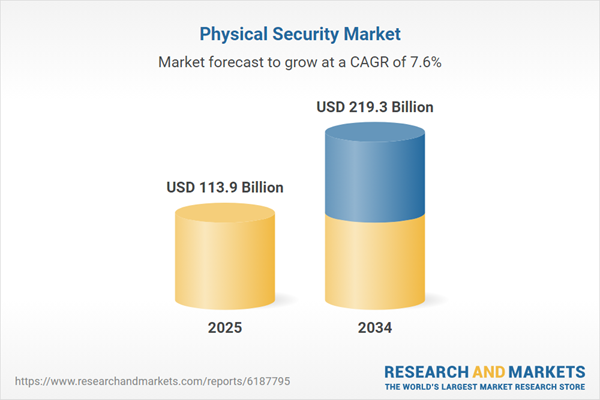Physical Security Market Overview
The physical security market is experiencing significant growth as organizations prioritize safeguarding assets, personnel, and infrastructure from evolving threats. Physical security encompasses a broad spectrum of solutions, including surveillance cameras, access control systems, perimeter security, and security personnel, all designed to prevent unauthorized access, theft, vandalism, and potential terrorist threats. With increasing risks posed by cyber-physical attacks, businesses are integrating physical security with digital security measures to create a comprehensive security framework. Governments, enterprises, and critical infrastructure providers are investing heavily in advanced security technologies to enhance threat detection, real-time monitoring, and incident response capabilities. The growing need for regulatory compliance, particularly in industries such as banking, healthcare, and transportation, is also fueling market demand. Technological advancements, including AI-driven surveillance, biometric authentication, and IoT-enabled security systems, are transforming how organizations approach physical security, making it more proactive, automated, and intelligent.the physical security market is seeing rapid advancements in AI-powered video surveillance, facial recognition, and behavioral analytics. AI-driven security cameras are becoming standard in commercial and public spaces, enhancing threat detection accuracy and reducing false alarms. The adoption of cloud-based security management platforms is increasing, allowing centralized monitoring and real-time access to security data across multiple locations. Biometric access control solutions, including fingerprint and retina scanning, are gaining traction as businesses seek higher security and seamless user authentication. Additionally, the expansion of 5G networks is improving the efficiency of security devices, enabling faster data transmission, remote surveillance, and real-time communication between security systems. Governments and private enterprises are also emphasizing smart city security initiatives, integrating IoT sensors, AI, and automated security controls to improve urban safety and law enforcement efficiency. Furthermore, the demand for drone surveillance and robotic security solutions is growing, particularly in critical infrastructure, large-scale events, and high-risk environments where human surveillance may be limited.
The physical security market is expected to witness deeper integration with cybersecurity frameworks, ensuring holistic protection against both physical and cyber threats. AI and machine learning will play a crucial role in predictive security analytics, allowing organizations to identify and prevent security breaches before they occur. The adoption of blockchain technology is anticipated to enhance security data integrity, providing an immutable record of security events and access logs. Smart cities will increasingly deploy autonomous security solutions, including AI-powered drones and robotic guards, to enhance public safety and surveillance operations. Cloud-based security services will become more sophisticated, offering AI-driven insights, automated threat response, and enhanced interoperability with enterprise security ecosystems. Furthermore, as regulatory requirements continue to tighten, businesses will need to invest in more robust identity and access management solutions to meet compliance standards and protect sensitive infrastructure. The convergence of IoT, AI, and edge computing will also drive innovation in real-time security monitoring, enabling faster and more efficient security responses across various industries.
Key Insights: Physical Security Market
- AI-Powered Video Surveillance: AI-driven security cameras equipped with facial recognition and behavioral analytics are transforming threat detection, reducing false alarms, and improving incident response times.
- Cloud-Based Security Management: Organizations are adopting cloud security platforms to enable centralized monitoring, real-time alerts, and remote access to security data across multiple locations.
- 5G-Enabled Security Systems: The deployment of 5G networks is enhancing security device efficiency by enabling faster data transmission, seamless connectivity, and real-time surveillance capabilities.
- Drone and Robotic Security Solutions: The use of drones and AI-powered security robots is increasing in large-scale events, critical infrastructure protection, and high-risk environments for automated surveillance.
- Biometric Access Control Expansion: Advanced biometric authentication, including facial, iris, and fingerprint recognition, is gaining popularity for secure and frictionless access management in enterprises and public spaces.
- Rising Security Threats and Terrorism Concerns: Increasing incidents of security breaches, vandalism, and terrorist threats are driving businesses and governments to invest in advanced physical security solutions.
- Stringent Regulatory and Compliance Requirements: Industries such as healthcare, finance, and transportation are mandated to implement robust physical security measures to comply with strict regulations.
- Growing Adoption of Smart Cities and IoT: The expansion of smart city projects and IoT-enabled security infrastructure is increasing the demand for integrated security solutions for urban safety.
- Advancements in AI and Automation: AI-driven security technologies and automation are improving threat detection, reducing response times, and enhancing overall security efficiency in various sectors.
- High Implementation and Maintenance Costs: The deployment of advanced security systems, including AI surveillance, biometric authentication, and IoT security solutions, requires significant investment, making affordability a challenge for small and medium-sized enterprises.
Physical Security Market Segmentation
By Component
- Systems
- Services
By Organization Size
- Small and Medium-Sized Enterprises (SMEs)
- Large Enterprises
By End-User
- Transportation
- Government
- Banking and Finance
- Utility and Energy
- Residential
- Industrial
- Retail
- Commercial
- Hospitality
- Other End Users
Key Companies Analysed
- Hangzhou Hikvision Digital Technology Co.
- Ltd
- Allied Universal
- SECOM Co Ltd
- WESCO International
- Inc
- ADT LLC
- Cisco Systems Inc
- Axis Communications AB
- Honeywell International
- Inc.
- Dahua Tech
- Stanley Convergent
- Zicom Electronic Security Systems
- Godrej Security Solutions
- Samsung Techwin
- Sony Corporation
- Panasonic Corporation
- Safety Systems
- Genetec
- Bosch Security
- Milestone Systems
- Vanderbilt Industries
- Nedap Security Management
- Avigilon
- G4S Secure Solutions
- Prosegur Compañía de Seguridad
- S.A
- Securitas AB
- Salto Systems
- Paxton Access
- ABAX Systems Sp. z o.o
- SATEL S.A.
- ELDES Sp. z o.o
- MICRONIX s.r.o
- CETIN a.s
- 2N Telekomunikace a.s
- AxxonSoft
- Intelligent Security System
- Beward Co
- Securitas Romania
- Rheinmetall Automotive AG
- SSC Security Services Corp
- Paragon Security Verkada Inc
- Ajax Systems
- Ava Security
- Cloudvue
- Evolv Technology
- Securiguard
- Farnek Services LLC
- Aqua Security
- Safeway Security Services
- Grupo GR
- Brink's
- Sodexo
- VIPSEG
- Grupo Forteseg
- Fidelity Services Group
- Halogen Security Company Limited
- Bemil Nigeria Limited
- Proton Security Services
- Securex Agencies Limited
Physical Security Market Analytics
The report employs rigorous tools, including Porter’s Five Forces, value chain mapping, and scenario-based modeling, to assess supply-demand dynamics. Cross-sector influences from parent, derived, and substitute markets are evaluated to identify risks and opportunities. Trade and pricing analytics provide an up-to-date view of international flows, including leading exporters, importers, and regional price trends.Macroeconomic indicators, policy frameworks such as carbon pricing and energy security strategies, and evolving consumer behavior are considered in forecasting scenarios. Recent deal flows, partnerships, and technology innovations are incorporated to assess their impact on future market performance.
Physical Security Market Competitive Intelligence
The competitive landscape is mapped through proprietary frameworks, profiling leading companies with details on business models, product portfolios, financial performance, and strategic initiatives. Key developments such as mergers & acquisitions, technology collaborations, investment inflows, and regional expansions are analyzed for their competitive impact. The report also identifies emerging players and innovative startups contributing to market disruption.Regional insights highlight the most promising investment destinations, regulatory landscapes, and evolving partnerships across energy and industrial corridors.
Countries Covered
- North America - Physical Security market data and outlook to 2034
- United States
- Canada
- Mexico
- Europe - Physical Security market data and outlook to 2034
- Germany
- United Kingdom
- France
- Italy
- Spain
- BeNeLux
- Russia
- Sweden
- Asia-Pacific - Physical Security market data and outlook to 2034
- China
- Japan
- India
- South Korea
- Australia
- Indonesia
- Malaysia
- Vietnam
- Middle East and Africa - Physical Security market data and outlook to 2034
- Saudi Arabia
- South Africa
- Iran
- UAE
- Egypt
- South and Central America - Physical Security market data and outlook to 2034
- Brazil
- Argentina
- Chile
- Peru
Research Methodology
This study combines primary inputs from industry experts across the Physical Security value chain with secondary data from associations, government publications, trade databases, and company disclosures. Proprietary modeling techniques, including data triangulation, statistical correlation, and scenario planning, are applied to deliver reliable market sizing and forecasting.Key Questions Addressed
- What is the current and forecast market size of the Physical Security industry at global, regional, and country levels?
- Which types, applications, and technologies present the highest growth potential?
- How are supply chains adapting to geopolitical and economic shocks?
- What role do policy frameworks, trade flows, and sustainability targets play in shaping demand?
- Who are the leading players, and how are their strategies evolving in the face of global uncertainty?
- Which regional “hotspots” and customer segments will outpace the market, and what go-to-market and partnership models best support entry and expansion?
- Where are the most investable opportunities - across technology roadmaps, sustainability-linked innovation, and M&A - and what is the best segment to invest over the next 3-5 years?
Your Key Takeaways from the Physical Security Market Report
- Global Physical Security market size and growth projections (CAGR), 2024-2034
- Impact of Russia-Ukraine, Israel-Palestine, and Hamas conflicts on Physical Security trade, costs, and supply chains
- Physical Security market size, share, and outlook across 5 regions and 27 countries, 2023-2034
- Physical Security market size, CAGR, and market share of key products, applications, and end-user verticals, 2023-2034
- Short- and long-term Physical Security market trends, drivers, restraints, and opportunities
- Porter’s Five Forces analysis, technological developments, and Physical Security supply chain analysis
- Physical Security trade analysis, Physical Security market price analysis, and Physical Security supply/demand dynamics
- Profiles of 5 leading companies - overview, key strategies, financials, and products
- Latest Physical Security market news and developments
Additional Support
With the purchase of this report, you will receive:- An updated PDF report and an MS Excel data workbook containing all market tables and figures for easy analysis.
- 7-day post-sale analyst support for clarifications and in-scope supplementary data, ensuring the deliverable aligns precisely with your requirements.
- Complimentary report update to incorporate the latest available data and the impact of recent market developments.
This product will be delivered within 1-3 business days.
Table of Contents
Companies Mentioned
- Hangzhou Hikvision Digital Technology Co. Ltd.
- Allied Universal
- SECOM Co Ltd.
- WESCO International Inc.
- ADT LLC
- Cisco Systems Inc.
- Axis Communications AB
- Honeywell International Inc.
- Dahua Tech
- Stanley Convergent
- Zicom Electronic Security Systems
- Godrej Security Solutions
- Samsung Techwin
- Sony Corporation
- Panasonic Corporation
- Safety Systems
- Genetec
- Bosch Security
- Milestone Systems
- Vanderbilt Industries
- Nedap Security Management
- Avigilon
- G4S Secure Solutions
- Prosegur Compañía de Seguridad S.A
- Securitas AB
- Salto Systems
- Paxton Access
- ABAX Systems Sp. z o.o
- SATEL S.A.
- ELDES Sp. z o.o
- MICRONIX s.r.o
- CETIN a.s
- 2N Telekomunikace a.s
- AxxonSoft
- Intelligent Security System
- Beward Co
- Securitas Romania
- Rheinmetall Automotive AG
- SSC Security Services Corp
- Paragon Security Verkada Inc.
- Ajax Systems
- Ava Security
- Cloudvue
- Evolv Technology
- Securiguard
- Farnek Services LLC
- Aqua Security
- Safeway Security Services
- Grupo GR
- Brink's
- Sodexo
- VIPSEG
- Grupo Forteseg
- Fidelity Services Group
- Halogen Security Company Limited
- Bemil Nigeria Limited
- Proton Security Services
- Securex Agencies Limited
Table Information
| Report Attribute | Details |
|---|---|
| No. of Pages | 160 |
| Published | October 2025 |
| Forecast Period | 2025 - 2034 |
| Estimated Market Value ( USD | $ 113.9 Billion |
| Forecasted Market Value ( USD | $ 219.3 Billion |
| Compound Annual Growth Rate | 7.5% |
| Regions Covered | Global |
| No. of Companies Mentioned | 58 |









